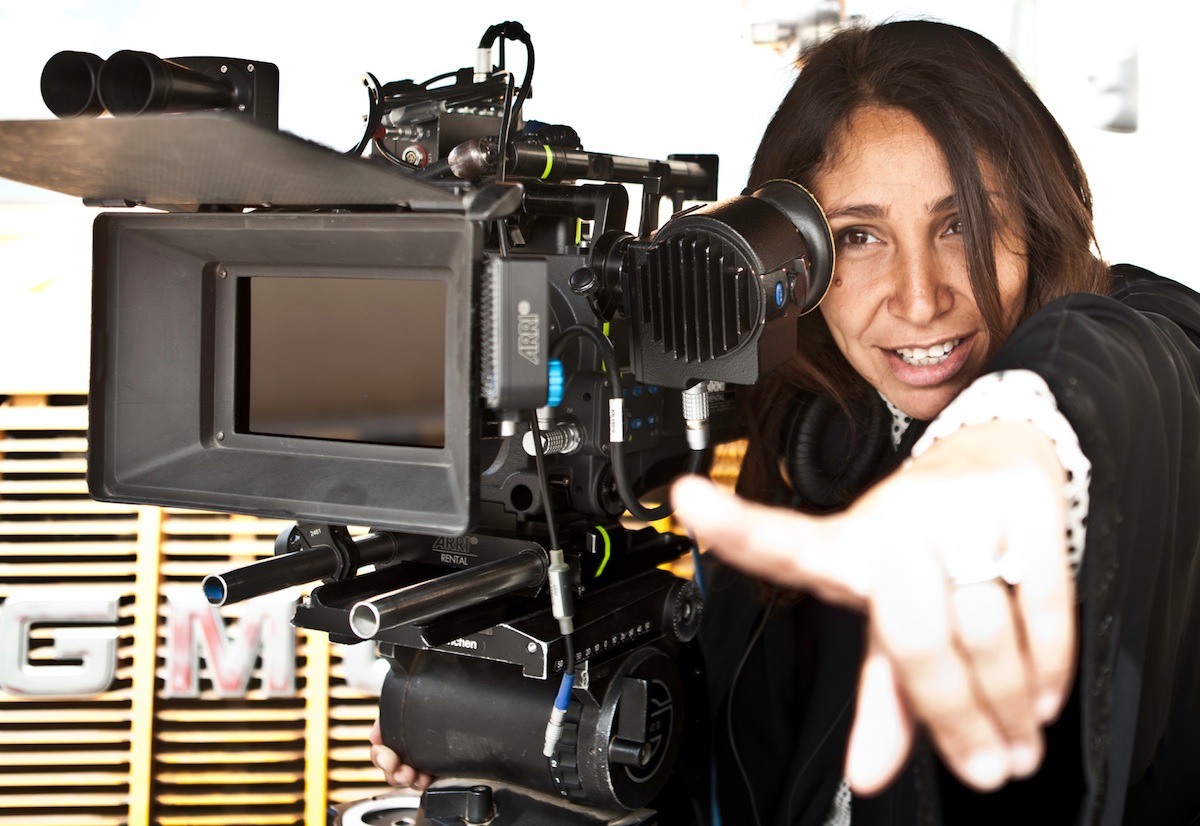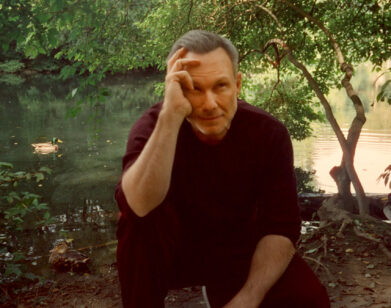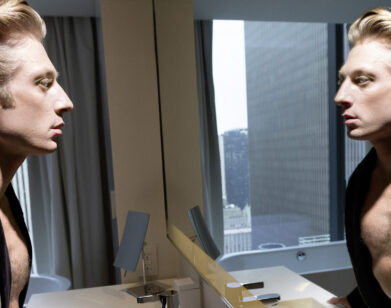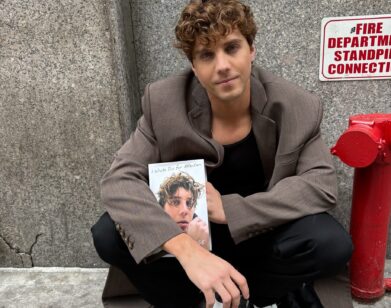The Lady with the Bike Movie: Haifaa Al Mansour

ABOVE: HAIFAA AL MANSOUR. PHOTO COURTESY OF TOBIAS KOWNATZKI/RAZOR FILM/SONY PICTURES CLASSICS
On the morning of our interview with Haifaa Al Mansour, we knocked on the door of the wrong hotel room. The man who answered quickly became excited when he learned we were looking for the writer/director of Wadjda, and that now we realized she was in the room next door. “She’s here? In this hotel?” he exclaimed, before barging into her room and telling her PR company representatives that he saw the film in Israel, and thought it was wonderful, and wanted to give his compliments to the director.
He’s not the only one. Wadjda has won 14 awards internationally, and 12 of them went to Al Mansour. It’s an impressive feat for anyone, made even more remarkable by the following facts: Wadjda is Al Mansour’s first feature film, it’s the first movie to be filmed entirely in Saudi Arabia, and Al Mansour is the first female Saudi Arabian filmmaker.
It’s also a lovely film in itself. Wadjda is a spunky 10-year-old girl growing up in Riyadh, the capital of Saudi Arabia, where the culture is incredibly conservative, especially in regards to women. After a fight with her friend Abdullah, she notices a bicycle, and we follow her quest to buy this item that society says she, as a woman, cannot use. Along the way, we learn about her father and mother’s relationship, which is complicated by the fact that his family wants him to take a second wife. It’s a slice-of-life story that’s both hopeful and at times tragically beautiful.
We sat down with Al Mansour (once we got rid of the interloping neighbor) to talk about how Wadjda was clearly too cool to be 10, how Al Mansour occasionally had to direct from a van with a walkie-talkie, and the sketchy back rooms in video stores.
CASSIE TITLE: Wadjda is the first movie filmed entirely in Saudi Arabia. I know the culture’s very conservative, but is there another reason that no one’s done this before?
HAIFAA AL MANSOUR: I think nobody tried because there’s no industry in film in Saudi. If you do a film, there is no way to distribute it. You want to be able to make money out of it, so a lot of people go to TV because TV’s huge and there’s a lot of money—there is business and there are stars and there is sort of an infrastructure, so it’s easy to plug in there if you are interested in directing.
TITLE: Which is interesting, because to me film and TV seem kind of similar, so I was wondering why you think the culture’s embraced TV but not film.
AL MANSOUR: I think it’s the public exposition of art that’s not accepted. Society’s segregated, and the public space is supposed to be kept pure.
TITLE: TV’s usually inside…
AL MANSOUR: Exactly. It is okay to watch films inside your home. Blockbusters are big, video rentals and all that.
TITLE: I haven’t heard the name Blockbuster in forever!
AL MANSOUR: I watched a lot of films growing up. We were able to go and get VHS. But it [the video rental store] is a place that is considered immoral for women to enter. There was a sign like: Women are not allowed to go in! So I would go and wear my abaya outside and wait.
TITLE: It’s funny because there were those rooms in the back of video stores for the “dirty” porno movies, where you could only enter if you were a certain age. So that’s what I’m picturing right now!
AL MANSOUR: [laughs] Yes! And I would sit outside and they would bring the catalogue, and you’d check the films you’d want, and they’d bring it back.
TITLE: Can we talk a little more about your childhood? I know you were one of 12 children.
AL MANSOUR: I’m number eight!
TITLE: And your father [Abdul Rahman Mansour] was a poet. Was everyone creative?
AL MANSOUR: My sister is a painter. She used to be a doctor, and she quit medicine just to be an artist. And my mother sings. She never took a singing profession, but at home she always sings, and for our weddings and engagements, she made a special song for every one of the girls. It’s nice; that is the way she expresses her art. And I think if she were in a different world she would’ve been a great performer. She has this aura, you know? Some people who are actresses and singers…
TITLE: A star.
AL MANSOUR: Yes! She’s special. And it’s amazing to be around her; she gives me a lot of strength.
TITLE: The message of your film is to give Saudi women strength; that even in a constrictive culture, they can still follow their dreams. But do you think people need to have money to do this?
AL MANSOUR: No. I think now there are scholarships for women, so it takes financial pressure off the families. A lot of women are being sent from Saudi to study abroad. And I don’t come from a rich place; I grew up in a small town, my parents never spoke English. We were typically middle class; we weren’t very rich. They sent me to The American University in Cairo, which is kind of elitist of them, but it was a big chunk of our… They had to cut a lot. I don’t think it’s an issue of money; I think it’s an issue of really believing in yourself. There are opportunities for women now, and you have to be able to stand up for yourself, for what you believe in. And the culture is opening up and there are pockets, windows for women. But a lot of women are shy to take them because the culture will not accept women working in a mixed environment; they don’t want women to travel alone and study abroad. It may compromise women getting married quickly. It is very much like America in the 1940s, but it is more [conservative]; women have to be completely covered.
TITLE: You weren’t allowed to mix with men on the street during filming, so you were actually directing from a van on a walkie-talkie. Can we talk about that for a second? Because that’s kind of amazing.
AL MANSOUR: [laughs] When we were indoors, it was okay. But when we were outside in the street, I always had to be in the van. They had a monitor for me, and a walkie-talkie, and I screamed at everybody [laughs]: “Do this, don’t do that!” It was very frustrating to be confined in this little space and not be able to go for blocking, to feel the performance, to change things, but I felt it was very rewarding just to be able to make a film. And that is the law of the country, and I had to respect it. And for me, my aim at the end [was to] make a film and hopefully people saw themselves in it and they were moved; it was not to offend them or clash with the culture.
TITLE: Wadjda’s supposed to be 10, but I don’t buy it: she’s too cool, especially with her hipster music. I read she was based on your niece.
AL MANSOUR: [laughs] I based her a lot on one of my nieces, who was very mature for her age. She’s amazing and has a great sense of humor. And she’s a hustler and she’s always scheming somewhere to earn some money. She has so much energy and so much potential and pride in herself. But my brother is very conservative and of course he wanted her to conform and give up a lot of things she believed in. And she did and I felt it was really sad. And she was like every girl I went to school with. So I wanted to create a character who was like them but will never give up.
TITLE: Speaking of strong female characters: there’s a beautiful still shot of Wadjda’s mother smoking at the end, with her cut hair [which her husband had always wanted long] on the roof. In that moment, it’s clear that the complicated relationship with Wadjda’s father is over. And then she gives Wadjda the bike, and it’s as if she’s traded her reputation and happiness for her daughter’s independence and happiness.
AL MANSOUR: Absolutely! I can’t describe it even better.
TITLE: [laughs] No, no! I also loved the moment when Abdullah tells Wadjda that he’s going to marry her when they’re older.
AL MANSOUR: [laughs] He refused to say that!
TITLE: Because girls have cooties?
AL MANSOUR: Yes. [laughs] He came to me and was like: [in a serious voice] “I don’t think I should say that.”
TITLE: Did the actors become friends?
AL MANSOUR: They became really good friends. He’s very organized and he came in with his script all highlighted, and Waad [who plays Wadjda]—you don’t want to see her book, it’s all messed up. It’s a great balance. She taught him how to be street savvy and he taught her how to do things right. He speaks very good English, so he translated a lot, since we had a German crew. She doesn’t speak English at all, outside of Justin Bieber’s songs—that is all she knows.
TITLE: [laughs] Of course! So what are your future plans?
AL MANSOUR: I still don’t know yet. But I want to work with Razor Film, the German production company, and also the Saudi company that supported this film, because they took a risk on a film like this. Hopefully we’ll make something new. The second project is always harder.
TITLE: Did you ever think as a kid standing outside of Blockbuster you’d be the one making the film?
AL MANSOUR: No! Not ever!
SONY PICTURES CLASSICS RELEASES WADJDA TODAY, SEPTEMBER 13, IN THEATERS.






